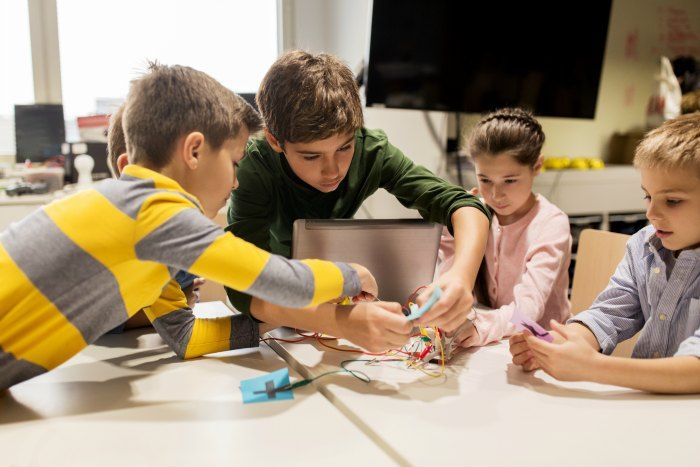Our world runs on computer code, from video games, to our banking system, to entertainment like Netflix.
Understanding the basics of how to code gives your kids an important insight into how computers work, and thus how the world works. Understanding how to code has plenty of other benefits, including fostering creativity, building confidence, encouraging persistence, and building problem-solving skills.

So, given that coding is so important, how do we encourage more kids to code? I think is starts with making coding fun and interesting.
Coding is a part of our life here at The Parent Spot. My husband started his career as a coder, and my son is now in university taking computer programming. My daughter’s a pretty capable coder as well, and I’ve even worked as a technical writer writing manuals for computer software. All that is to say: we’re a bunch of geeks over here.
How to Make Coding Fun for Kids
Because we’re all so familiar with coding, I decided to bring this question to the family: How do we make coding fun for kids. We brainstormed for a while, and here are the ideas we came up with!
Make Coding a Game
The first suggestion we came up with is to make coding fun! If you can make coding a game, you can get kids interested in how to code, almost without them realizing it.
CodeMonkey is a fantastic place to start! It’s aimed at kids aged six to fourteen, and teaches real coding languages like CoffeeScript and Python, all while encouraging kids to have fun.
Encourage Kids to Join Coding Clubs or Camps
Coding is a lot more fun with friends! Luckily, there are plenty of options to code with other kids.
I’ve seen plenty of local summer coding camps offered by our local university and college. There are even entire online clubs and camps that kids can join – year long.
If you’re lucky, your child’s school may even have an after school coding club.

Kids Can Take Coding in School
Many schools offer coding classes as an elective in school as well! Our local middle school offered classes in coding for video games. High school had a much bigger selection of coding classes, with everything from video game coding to cybersecurity to college immersion classes!

Get Kids Engaged in Coding Projects That Make a Difference
Kids love to see their efforts create real change! Encourage them to tackle coding projects that address real-world issues. This boosts their coding skills, problem-solving abilities, and adds sense of social responsibility.
Here are a few examples of coding projects:
- Environmental Apps: Guide them to build simple apps that promote environmental awareness. For instance, a recycling guide app that helps users sort waste correctly, or a water conservation game that teaches water-saving habits.
- Community Helpers: How about a local community app? Kids can create a platform where neighbors can share resources or tools, fostering a sense of community and collaboration.
Projects like these empower kids to see themselves as change-makers, using code to make the world a better place. Plus, they get a kick out of knowing their creations are out there, making a difference!

Rewards and Positive Reinforcement
Celebrating every step in the coding journey keeps kids motivated and excited! Here are some creative ways to reward their progress:
- Certificates of Achievement: Create fun, personalized certificates for different milestones, like “First App Created” or “Coding Wizard.”
- Showcase Their Work: Organize a family or friends’ tech show where kids can present their projects. It’s a fantastic way for them to share what they’ve learned and receive applause for their hard work.
- Coding Stickers and Badges: Kids love stickers and badges! Reward them with coding-themed stickers for each new concept they master.
Remember, every child progresses at their own pace. Celebrating the small victories keeps the learning process fun and engaging, instilling a lifelong love for coding.
Teaching coding to your kids can be an adventure filled with ups and downs, but remember, you’re not just teaching them a skill; you’re opening a world of endless possibilities.
More great articles:
